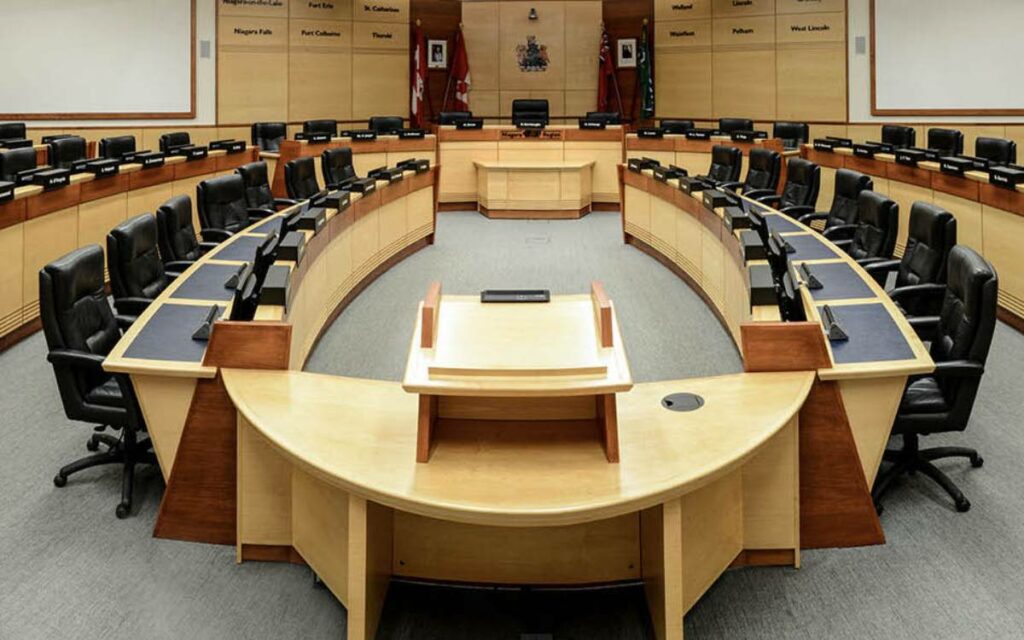
Niagara residents already pay among the highest property levies and water rates in southern Ontario.
Last week, Niagara Region Council voted to increase property taxes and water rates, shouldering the costs of a bigger regional government on both residents and businesses.
This is the fourth consecutive year of property tax increases, placing Niagara amongst the highest property tax rates in southern Ontario. Seemingly unconcerned about the economic impact of the pandemic on families, regional staff presented a proposed 4.35% increase in property taxes and 5.2% increase in water rates.
“We must do better”, declared Regional Councillor Bob Gale, “We cannot hit taxpayers with another 4.35% increase in property taxes.”
Gale requested his council colleagues refer the budget back to staff “…with guidance to come back under 2% for both our levy and water rates.”
Yearly Increases
| Property Tax | Water Rates | |
| 2019 | 4.8% | 5.2% |
| 2020 | 6.0% | 5.2% |
| 2021 | 2.9% | 2.0% |
| 2022 | 4.35% | 5.2% (proposed) |
The year after year increase to property taxes has placed Niagara’s communities on top of the highest property rates to be imposed on homeowners and businesses. For example, last year St. Catharines was in the top three of the highest property rates in all of southern Ontario.
| Rank | Community | $500,000 Assessment | $750,000 Assessment |
| 1. | Windsor | $13,640.01 | $18,186.68 |
| 2. | St. Catharines | $10,918.10 | $14,557.46 |
| 3. | Peterborough | $10,861.84 | $14,482.45 |
| — | |||
| 10. | Hamilton | $9,064.25 | $12,085.67 |
| 24. | Burlington | $5,846.87 | $7,795.83 |
MPAC’s Value Assessments Reprieve
In Ontario, the value of a home is assessed by the provincial agency MPAC (Municipal Property Assessment Corporation). The municipality then sets the tax bill by multiplying their tax rates with the MPAC assessed value.
The value of your home is assessed by MPAC every four years. The last assessment was made in 2016, and the next scheduled assessment was to be completed in 2020. However, to provide COVID-19 tax relief efforts, MPAC decided to freeze property value assessments at 2016 levels through the 2024 tax year.
This created a tax reprieve for existing and newly-relocated homeowners.
In contrast, ignoring MPAC’s tax relief actions on home values, Niagara Region simply continued to increase property taxes and water rates. In addition to the rising cost of homes in Niagara, residents and businesses now pay amongst the highest property taxes in southern Ontario.
Reserves and Moratoriums
“The effect of COVID-19 on homeowners, families, businesses”, referenced Mayor Frank Campion from Welland, “I believe we are not out of it yet…now is not the time to be raising taxes by (4.35%), it is not the time to do it.”
Campion continued, “We are not out of the emergency yet…It has had a huge impact on residents…we need to get (taxes) back down to a reasonable number, I would say it is 2%”.
To lower the tax rate, Regional Council proposed to utilize $6 million from the Taxpayer Relief Reserve, to lower the tax increase to 2.87%.
In response, Campion pleaded, “I still think 2% is the number.”
Councillor Leanna Villella (Welland) agreed that 2.87% needs to be further lowered as recommended by Campion. Speaking to the impacts of the pandemic on homeowners, Villella said: “To have the taxpayers incur this, it is just not something I could accept at this point in time. “
This prompted Gale to propose an amendment motion (supported by Councillor George Darte) to further lower taxes from 2.87% to 2.0%, or a total of $3.5 million. In addition to using reserves, Gale proposed not increasing the size of government with hiring six positions in the CAO’s office.
Gale’a motion to lower taxes to 2% was defeated 20-10, with the following vote tally:
Voting Against 2%
Bradley
Butters
Disero
Easton
Edgar
Foster
Greenwood
Heit
Huson
Insinnia
Ip
Jordan
Nicholson
Redekop
Rigby
Sendzik
Steele
Ugilini
Whittiveen
Zalepa
Voting For 2%
Byslma
Campion
Chiocchio
Darte
Fertich
Gale
Gibson
Junkin
Villella
Whalen
Then on a technical and confusing ruling, Budget Chair Gary Zalepa from Niagara-on-the Lake refused to accept Gale’s motion of a hiring moratorium in the CAO’s office.
The three-hour budget meeting ended up with a proposed 2.87% tax hike and an increase in the size of government.
Niagara communities remain on top of the list of highest property tax rates in southern Ontario. With reserves flush with cash, however, there is still no relief to the homeowner.
The final vote to ratify the 2022 Region of Niagara budget, with a 2.87% tax hike, will take place this Thursday, Dec. 16.




















